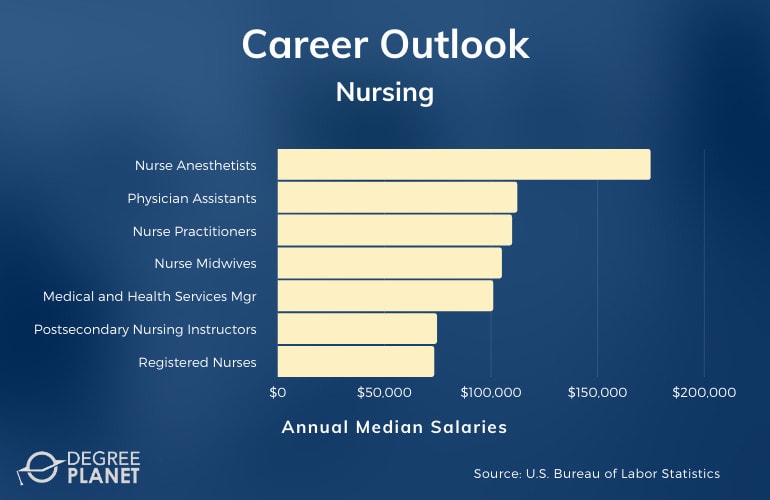Is being a nurse worth it? Many students choose nursing education because it provides a skill set that will always be in demand.

Editorial Listing ShortCode:
As a nurse, you might be able to help other people, engage with your community, promote healing, and encourage healthy living.
Is Being a Nurse Worth It?

Yes, becoming a nurse is worth it for many students. Nursing is a popular career path because nursing skills are needed in a variety of settings. Nearly everyone depends on the care of a nurse at some point in life, so there will likely always be a demand for trained professionals in this field.
In fact, the Bureau of Labor Statistics predicts that the demand for qualified nurses will increase through the next ten years. The rising age of the general population is one contributing factor to this growing demand. Much of this growth will come from jobs with outpatient care centers, residential facilities, and home health agencies.
The Bureau of Labor Statistics predicts a 7% growth rate in job opportunities for registered nurses (RNs). For licensed practical nurses (LPNs), it’s a 9% growth rate. Both of these categories are increasing more quickly than the national average across all job categories.
Tremendous employment growth is expected, though, for advanced practice registered nurses (APRNs), which will make being a nurse practitioner worth it for many nursing professionals. APRNs should see 45% job growth in the next decade, which is an outstanding growth rate. Nurse practitioner positions in particular are predicted to have 52% job growth.
Editorial Listing ShortCode:
Nursing careers offer various potential job settings, including doctor’s offices, schools, hospitals, insurance companies, social service agencies, health departments, and nursing homes. Some nurses even travel from place to place.
The field of nursing also provides many opportunities for advancing your career and pursuing specialized opportunities. With short-term vocational training, you can enter the field as an assistant. Additional education and licensure can help qualify you to work as an LPN or RN.
With graduate training, you can pursue licensure as an advanced practice registered nurse. Types of APRNs include clinical nurse specialists, nurse practitioners, nurse anesthetists, and nurse midwives.
Experienced, educated nurses can also pursue a variety of leadership positions, such as leading a team of nurses in a healthcare facility. Depending on your interests, you can also explore the fields of health informatics, medical service management, community health education, and postsecondary training.
How to Decide Whether Nursing Is Right for You

The nursing profession can be fulfilling, but it can also be demanding. It sometimes involves long hours, hard work, and even heartbreak.
Like many nurses, you might find the effort entirely worthwhile, but it’s still beneficial to enter this profession fully informed about whether this is the right career path for you.
1. You’re caring and compassionate.
Most nurses see many patients every day, so people skills are a must. Patients may be dealing with illnesses, injuries, and other hardships. They’ll likely appreciate empathetic care.
Even when you have to exhibit tough love, a compassionate nature can make all the difference in how the message is received.
2. You’re good at listening and speaking.

To help patients address their health concerns, you’ll need to listen to what they share about their symptoms. You’ll also listen to what fellow nurses, doctors, and other medical professionals have to say.
Being good at delivering clear messages can also be helpful. This skill can come in handy as you give instructions to patients, explain diagnoses, or communicate with doctors about the symptoms that patients are experiencing.
3. You’re a team player.
Nurses don’t usually work alone. In your workplace, you might collaborate with nurses, doctors, medical assistants, administrators, and other professionals. Each person’s input can contribute to patient care.
Nurses often need to listen to others, be open to gaining new knowledge, and be willing to pitch in where needed.
4. You’re comfortable with bodily fluids and medical settings.

If you don’t like hospitals or can’t stand the sight of blood, a nursing career might not be the best fit.
While not all nurses regularly work with infectious or injured patients, you can expect to get up close and personal with all sorts of medical situations during your nursing school clinical rotations.
5. You have sharp mental abilities.
Nurses often have to think on their feet. You may need to process large amounts of information at once, anticipate doctors’ requests, and think through potential treatment options.
Editorial Listing ShortCode:
In many cases, the demands of the job can require you to balance these tasks for multiple different patients during each shift.
5 Things You Can Do with a Nursing Degree
Whether you want to work directly with patients or coordinate operations behind the scenes, there are various roles available in the nursing field. Some of the most popular or intriguing career options for nursing graduates are listed below.
1. Registered Nurse

Many people enter the nursing profession as registered nurses (RNs). Either an associate degree or bachelors degree program can help prepare you for this role, but you may have more opportunities with a bachelors degree. A number of working registered nurses find it worth it to enter one of the fast track RN to BSN online programs that some universities offer.
Registered nurses work in a variety of settings, including outpatient care centers, pediatric offices, hospitals, nursing homes, and government agencies. Their job responsibilities can include recording patient information, running tests, explaining diagnoses, or administering immunizations.
2. Health Informatics Specialist

You could pair your career as a nurse with additional training in information technology. IT services applied to healthcare settings are often known as health informatics. Your nursing experience can be a unique asset in an informatics role.
Nurse informaticists can contribute to the development of technology systems for improving patient care and maintaining medical records. They may also teach other nurses how to use electronic systems.
3. Nurse Practitioner

With a graduate degree in nursing, you might qualify to become a nurse practitioner. This licensure allows you to take on additional responsibilities beyond those of an RN.
In many states, licensed nurse practitioners can perform many of the same tasks as doctors, such as writing prescriptions or ordering tests. As a nurse practitioner, you might work in family practice, emergency medicine, pediatrics, geriatrics, or another specialty.
4. Medical and Health Services Manager

A nursing background can help prepare you for a leadership role in a healthcare organization.
You might oversee a nursing team, a department, or an organization. The responsibilities can encompass quality management, budgeting, regulatory compliance, and staff scheduling.
Leadership positions can be found in hospitals, doctor’s offices, surgical centers, and even public health departments. With the correct licensure, you might qualify to be a nursing home administrator.
5. Nurse Midwife
If you’re interested in women’s care or helping bring new babies into the world, you might consider earning a graduate degree in hopes of becoming a nurse midwife.
Editorial Listing ShortCode:
In addition to a degree, nurse midwives typically need to become certified by the American Midwifery Certification Board. Nurse midwives tend to deliver babies during natural births, assist with surgical deliveries, and provide gynecological and reproductive care.
Nursing Degree Alternatives

Nursing is an attractive career option for many students, but the nurse life isn’t necessarily for everyone. Before committing to a nursing program, you may want to consider whether one of these alternative degrees might be more up your alley.
- Bachelor’s in Biology. If you have your sights set on going to medical school and becoming a doctor, a biology degree can help you get started.
- Bachelor’s in Healthcare Administration. You might prefer to work on the administrative side of healthcare instead of the clinical side. In that case, a degree in healthcare administration can provide both the medical and business know-how that you’ll need.
- Bachelor’s in Public Health Education. While some nurses do spend time teaching and educating people, it’s not always their top responsibility. If that’s the part of the job that most interests you, you might prefer to major in health education.
If you need further help narrowing down your choices, you can also take a look at the curriculum that each degree program would cover.
Nursing Careers & Salaries

Nursing is a broad field with many different job opportunities in various work environments, including medical facilities, schools, residential facilities, and community agencies.
According to the Bureau of Labor Statistics, the average annual salary for healthcare practitioners and technical occupations is $68,190.
| Careers | Annual Median Salaries |
| Nurse Anesthetists | $174,790 |
| Physician Assistants | $112,260 |
| Nurse Practitioners | $109,820 |
| Nurse Midwives | $105,030 |
| Medical and Health Services Managers | $100,980 |
| Postsecondary Nursing Instructors and Teachers | $74,600 |
| Registered Nurses | $73,300 |
| Health Education Specialists | $55,220 |
| Licensed Practical and Licensed Vocational Nurses | $47,480 |
| Nursing Assistants | $29,660 |
The required education for a job in the nursing field varies depending on the role. For example, nursing assistants generally only need vocational training, but advanced practice registered nurses require masters degrees.
What Is a Nurse?

A nurse is a healthcare professional who can take care of a wide variety of responsibilities in the medical world.
Nurses are trained to handle medical tasks, listen to patients, provide support, and communicate with other healthcare providers. In many cases, nurses play some of the most vital roles in a healthcare facility.
There are a variety of categories within the nursing profession. These include licensed practical nurse (LPN), licensed vocational nurse (LVN), registered nurse (RN), and advanced practice registered nurse (APRN). Educational and licensure requirements vary from one type of nurse to the next.
What Do Nurses Do?

If you enter the nursing profession, you might discover that there’s nearly no end to the many jobs that nurses do. Nursing school can train you to carry out a wide variety of tasks that help keep healthcare facilities running smoothly.
For example, registered nurses spend time with patients to learn about their health. This might include measuring their vital signs and discussing their symptoms. They’ll often record notes to include in their patients’ medical records.
A nurse is one member of a medical team. They communicate with other healthcare providers, including doctors, and work together to provide treatment. Nurses can contribute by administering tests and giving out medication, among other responsibilities.
Editorial Listing ShortCode:
Patients often rely on their nurses throughout the healthcare process. Nurses may provide a listening ear, serve as a go-between for families and doctors, explain diagnoses, and offer discharge directions.
While many nurses work in a hospital setting, that’s far from your only option. Some nurses find work in drug treatment facilities, elementary schools, mental health centers, colleges, insurance companies, nursing homes, and community clinics.
What Is It Like Being a Nurse?

For many nurses, no two days are the same. Nursing can bring you into contact with a wide range of people, and each one may have different needs for you to address. Throughout a shift, a nurse might run different tests, use a variety of equipment, and communicate with many other healthcare providers. Quick thinking can be critical.
Some days can be stressful. Shifts can be hectic, and nurses can end up juggling multiple tasks at one time. The nurse lifestyle often means being on your feet for many hours at a time.
Despite the stressful moments, many people find nursing to be a richly rewarding career path. There can be great satisfaction that comes from knowing that you’re helping people.
Whether they’re supporting a family who’s saying goodbye to a loved one or helping bring a new baby into the world, nurses can play a part of some of life’s most important events. Even tasks that can seem more mundane can help contribute to others’ health and wellbeing.
Is Nursing a Good Career?

Nursing skills are always needed. After graduating from nursing school, you may find countless opportunities to put your skills into practice. Nurses contribute to healthcare organizations, nonprofit agencies, private businesses, educational institutions, government departments, and more.
The Bureau of Labor Statistics is also expecting an uptick in the number of nursing jobs that will be available over the next several years. Positions for RNs are expected to increase at a 7% rate.
Those who go on to pursue a graduate education may have even more job opportunities since the Bureau of Labor Statistics is predicting a 45% growth rate for APRNs.
RNs earn an average salary of $73,300 per year. Most RN salaries fall between $52,080 and $111,220. With an average salary of $79,790, government positions pay some of the highest average wages for registered nurses (Bureau of Labor Statistics).
Nursing can be hard work, but it can also bring the satisfaction of knowing that your work is making a difference for others.
Is It Hard to Become a Nurse?

While there are multiple paths toward becoming a nurse, the path of earning a Bachelor of Science in Nursing (BSN) and becoming an RN typically offers the most growth and development opportunities.
For a bachelors degree, you’ll typically take general education classes as well as healthcare courses. Nursing programs also include many science classes. You’ll take courses like microbiology, human anatomy and physiology, and chemical biology.
Clinical experiences are a key component of nursing education. You may be on your feet for long hours during your clinical rotations. It’s helpful, though, to be open to learning from your mentors and trying new things.
How Long Does It Take to Become a Nurse?

There are different levels of nursing licensure, so how long it takes to become a nurse can depend on which option you are pursuing.
- Licensed Vocational Nurse (LVN): 1 year vocational program
- Registered Nurse (RN): 2 year Associate of Science in Nursing (ASN) or 4 year Bachelor of Science in Nursing (BSN)
- Bachelor of Science in Nursing (BSN): About 4 years for those first entering the nursing field or around 18 to 24 months for RN-to-BSN programs
After finishing your education, you can then complete a licensure examination. After a BSN program, you can choose to spend around 2 more years getting a Master of Science in Nursing, which can often lead to advancement opportunities.
Some nurses also find that earning a doctorate degree, such the Doctor of Nursing Practice, may help them advance in their careers. If your work hours prevent you from returning to a traditional classroom program, it may be worth looking into one of the shortest online DNP programs to see how this degree could benefit you.
Getting Your Nursing Degree Online

Nursing is an in-demand profession, and it’s also a field that offers growth and leadership opportunities. After graduating with your nursing degree, you can pursue varied jobs that allow you to use your skills to help other people.
If you’re ready to start the process of becoming an RN, you may want to take a look at online nursing colleges. You might be able to complete much of the coursework online and fulfill your clinical experiences at a local healthcare facility.
An accredited online nursing program can help provide a solid foundation for the rewarding field of nursing.

